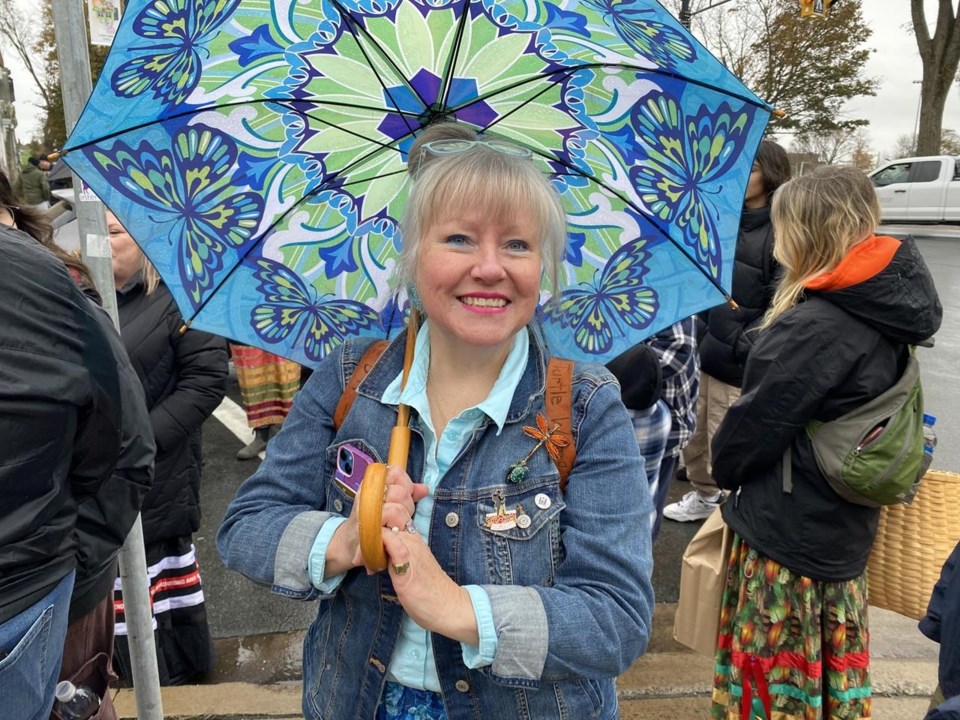HALIFAX — The Halifax street that had long honoured a colonial governor who issued a bounty on the scalps of Mi’kmaq people has been renamed to commemorate a Millbrook First Nation activist and “unsung hero” of residential school survivors.
Seeing Nora Bernard Street signs in person for the first time Monday was emotional, Bernard’s daughter Natalie Gloade said after a renaming ceremony.
“My mother was a warrior and a force to be reckoned with,” Gloade said.
“And she was so very, very humble. She would have probably said the naming should go to someone else,” she said with a laugh.
Nora Bernard, from Millbrook First Nation in Truro, N.S., was a residential school survivor who fought a 15-year court battle to win compensation for Indigenous children forced to attend those schools.
Following Bernard’s legal fight, survivors of residential schools across Canada filed similar lawsuits, which were amalgamated and led to a national settlement in 2005 for more than $5 billion.
Millbrook First Nation Chief Bob Gloade said Monday he hopes the street renaming will increase Nova Scotians’ and Canadians' awareness of Bernard, who he calls an "unsung hero."
Gloade said Bernard was “kindhearted” and spent a great deal of time caring for her fellow survivors of the Shubenacadie residential school.
“She brought people into her home, she went to visit people, she was an advocate for the survivors of the residential school system,” he said.
“She took that upon herself to correct the wrongs that were done to herself, her friends and her fellow students, and it trickled right across the country to all residential school survivors."
Bernard’s relatives and friends in attendance said they remember her for her warmth, generosity and the care she gave all those around her.
During the ceremony, Danielle Gloade, one of Bernard’s many grandchildren, said that as she was driving into the city to see Nora Bernard Street Monday morning she “could envision my grandmother with her big smile.”
The Halifax road now called Nora Bernard Street was originally named after Edward Cornwallis, the founder of Halifax, who issued a bounty for the scalps of Mi'kmaq men, women and children in 1749.
In July 2021 Halifax Regional Municipality invited residents to vote on a new street name to replace Cornwallis, and Bernard was the top choice with more than 2,400 votes.
Halifax councillor Lindell Smith, who represents the north-end district that includes Nora Bernard Street, said the renaming is being celebrated by the city and especially by the neighbourhood’s historic African Nova Scotian community.
The street is home to New Horizons Baptist Church, which was known as the African Baptist Church when it was founded in 1832 and as Cornwallis Street Baptist Church when it was incorporated in 1892.
The historic church’s founder, Richard Preston, is credited with forming Nova Scotia’s African Abolition Society in 1846.
“The street has a really huge importance to the African Nova Scotia community here as well, and we’re just as excited to recognize somebody who was fighting for their people,” Smith said during the event Monday.
Smith said the renaming “wasn’t an easy road” and that he and his council peers received emails “from people with truthfully racist rhetoric" during the process.
“We defended this process in order to go through with some real reconciliation with our Mi’kmaq brothers and sisters," he said. "We had to do this.”
Bernard was killed in 2007 by her grandson James Douglas Gloade, who was sentenced to 15 years for manslaughter in 2008.
This report by The Canadian Press was first published Oct. 30, 2023.
Lyndsay Armstrong, The Canadian Press



